North Carolina General Assembly of October 1784
The North Carolina General Assembly of October 1784 met in New Bern from October 25, 1784 to November 26, 1784. The assembly consisted of the 116 members of the North Carolina House of Commons and 55 senators of North Carolina Senate elected by the voters on August 20, 1784. As prescribed by the 1776 Constitution of North Carolina the General Assembly elected Richard Caswell as Governor of North Carolina and members of the Council of State.[1][2][3][4][5]
| 9th North Carolina General Assembly (October 1784) | |||||
|---|---|---|---|---|---|
| |||||
| Overview | |||||
| Legislative body | North Carolina General Assembly | ||||
| Jurisdiction | North Carolina, United States | ||||
| Meeting place | New Bern | ||||
| Term | 1784 | ||||
| Senate | |||||
| Members | 55 Senators authorized | ||||
| Speaker | Richard Caswell | ||||
| Clerk | John Haywood | ||||
| Assistant Clerk | Sherwood Haywood | ||||
| House of Commons | |||||
| Members | 116 Delegates authorized | ||||
| Speaker | William Blount | ||||
| Clerk | John Hunt | ||||
| Assistant Clerk | John Haywood | ||||
| Sessions | |||||
| |||||
Councilors of State
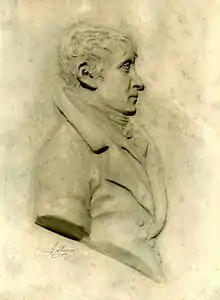
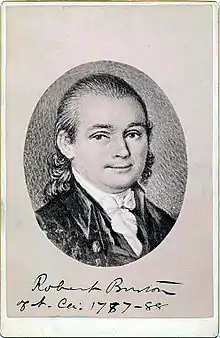
As prescribed by the 1776 Constitution of North Carolina, the General Assembly elected the governor and the following members of the North Carolina Council of State:[5][1]
- Joseph Leech, Craven County (President)
- James Kenan, Duplin County (President pro tempore)
- Winston Caswell, Dobbs County (Clerk)
- James Armstrong, Pitt County
- John Hawks, Craven County
- Robert Burton, Granville County
- Thomas Eaton, Warren County
- Abraham Sheppard, Dobbs County
James Glasgow continued as North Carolina Secretary of State (served 1777–1798). The assembly elected Memucan Hunt (served 1784–1787) as first statewide North Carolina State Treasurer. Alfred Moore continued (served 1782–1791) as North Carolina Attorney General.
Assembly membership
There were 55 counties in North Carolina in 1784. Each county was authorized to elect two representatives to the House of Commons and one delegate to the Senate. In addition, the six districts were authorized one delegate each. (Sullivan, Washington, Davidson, and Green counties would later become part of Tennessee in 1796.) Richard Caswell was elected Governor of North Carolina by this General Assembly but did not take the governor's office until 1785. According to a book by the Secretary of State edited by Cheney and published in 1974, this assembly had a second session that concluded in June 1784.[5][3][6][7]
House of Commons members
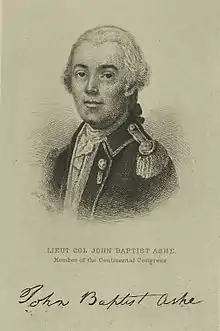
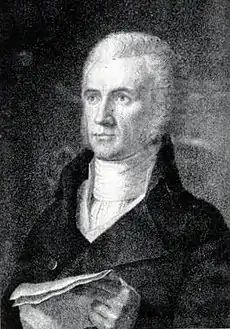
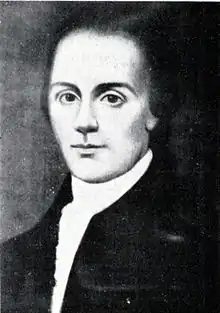
The House of Commons delegates elected a Speaker (William Blount), Clerk (John Hunt), Assistant Clerk (John Haywood), Doorkeeper, and Assistant Doorkeeper. The following delegates to the House of Commons were elected by the voters of North Carolina to represent each county and district:[3][4][5][6]
| County/District | Delegate |
|---|---|
| Anson | James Terry |
| Anson | John DeJarnett |
| Beaufort | Thomas Alderson |
| Beaufort | John Gray Blount |
| Bertie | Zedekiah Stone |
| Bertie | Andrew Oliver |
| Bladen | Samuel Cain |
| Bladen | Peter Robeson |
| Brunswick | Jacob Leonard |
| Brunswick | David Flowers |
| Burke | Joseph McDowell |
| Burke | Waightstill Avery |
| Camden | Benjamin Jones |
| Camden | Abner Harrison |
| Carteret | John Easton |
| Carteret | Eli West |
| Caswell | Edward Clay[note 1] |
| Caswell | William Moore |
| Chatham | Elisha Cain |
| Chatham | Joseph Stewart |
| Chowan | Clement Hall |
| Chowan | Michael Payne |
| Craven | William Bryan |
| Craven | William Blount[note 2] |
| Cumberland | Edward Winslow |
| Cumberland | James Emmett |
| Currituck | Joseph Ferebee |
| Currituck | Dr. James White[note 3] |
| Davidson | Elijah Robertson |
| Davidson | Ephraim McLean |
| Dobbs | William Caswell |
| Dobbs | John Sheppard |
| Duplin | Robert Dickson |
| Duplin | Thomas Gray |
| Edgecombe | Robert Diggs |
| Edgecombe | John Dalvin (Dolvin) |
| Fayette | William Rand |
| Fayette | Alexander McAllister |
| Franklin | Thomas Sherrod |
| Franklin | Durham Hall |
| Gates | Joseph Riddick |
| Gates | Seth Riddick |
| Granville | Thomas Person |
| Granville | Thornton Yancey |
| Greene | Alexander Outlaw |
| Greene | Unknown |
| Guilford | John Hamilton |
| Guilford | John Leak |
| Halifax | Benjamin McCulloch |
| Halifax | John Baptista Ashe[note 4] |
| Hertford | William Hill |
| Hertford | Thomas Brickell |
| Hyde | John Eborne |
| Hyde | William Russell |
| Johnston | Joseph Boon |
| Johnston | Kedar Powell |
| Jones | William Randall |
| Jones | Abner Nash[note 5] |
| Lincoln | John Sloan |
| Lincoln | Daniel McKissick |
| Martin | Nathan Mayo |
| Martin | Thomas Hunter[note 6] |
| Martin | John Ross |
| Mecklenburg | Caleb Phifer |
| Mecklenburg | David Wilson |
| Montgomery | Mark Allen |
| Montgomery | William Kendall |
| Moore | John Cox |
| Moore | William Seals |
| Nash | Micajah Thomas |
| Nash | John Bonds |
| New Hanover | Timothy Bloodworth[note 7] |
| New Hanover | James Bloodworth |
| Northampton | James Vaughan |
| Northampton | William Richardson Davie[note 8] |
| Onslow | Edward Starkey |
| Onslow | Daniel Yates |
| Orange | Alexander Mebane |
| Orange | John Butler |
| Pasquotank | Thomas Reading |
| Pasquotank | John Smithson, Jr. |
| Perquimans | John Reed |
| Perquimans | Robert Riddick |
| Pitt | John Jordan |
| Pitt | Richard Moye |
| Randolph | Joseph Robbins |
| Randolph | Aaron Hill |
| Richmond | Robert Webb |
| Richmond | Charles Robertson[note 9] |
| Rowan | William Sharpe[note 10] |
| Rowan | James Kerr |
| Rutherford | Richard Singleton |
| Rutherford | James Withrow |
| Sampson | David Dodd |
| Sampson | John Hay |
| Sullivan | William Cage |
| Sullivan | David Looney |
| Surry | Joel Lewis |
| Surry | James Martin |
| Tyrrell | Benjamin Spruill |
| Tyrrell | Nathan Hooker |
| Wake | Tignal Jones |
| Wake | John Humphries |
| Warren | John Macon |
| Warren | James Payne |
| Washington | Charles Robertson |
| Washington | Landon Carter |
| Wayne | William Alford |
| Wayne | John Handley |
| Wilkes | Benjamin Herndon |
| Wilkes | Jesse Franklin |
| Edenton District | Stephen Cabarrus |
| Halifax District | Henry Montfort |
| Hillsborough District | Archibald Lytle |
| New Bern District | Spyars Singleton |
| Salisbury District | Spruce McCoy (McCay, McKay) |
| Wilmington District | Archibald MacLaine |
Senate members
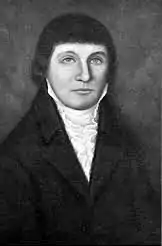
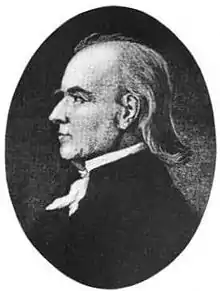
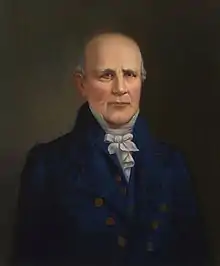

The Senators elected a President/Speaker (Richard Caswell, Sr.), Clerk (John Haywood), Assistant Clerk (Sherwood Haywood), Doorkeeper, and Assistant Doorkeeper. The following Senators were elected by the voters of North Carolina to represent each county:[3][4][5][7]
| County | Senator |
|---|---|
| Anson | Thomas Wade |
| Beaufort | John Smaw |
| Bertie | Jonathan Jaycocks |
| Bladen | Thomas Owen |
| Brunswick | William Walters |
| Burke | Charles McDowell |
| Camden | Isaac Gregory |
| Carteret | Enoch Ward |
| Caswell | Vacant |
| Chatham | Ambrose Ramsey |
| Chowan | William Boritz |
| Craven | James Coor |
| Cumberland | David Smith |
| Currituck | James Phillips |
| Davidson | Unknown / Vacant |
| Dobbs | Richard Caswell, Sr.[note 11] |
| Duplin | James Gillespie |
| Edgecombe | Isaac Sessums[note 12] |
| Fayette | Thomas Armstrong |
| Franklin | Vacant |
| Gates | William Baker |
| Granville | John Taylor |
| Greene | Unknown / Vacant |
| Guilford | James Galloway |
| Halifax | Nicholas Long |
| Hertford | John Baker |
| Hyde | Abraham Jones |
| Johnston | Benjamin Williams |
| Jones | Frederick Hargett |
| Lincoln | Robert Alexander |
| Martin | Whitmell Hill[note 13] |
| Mecklenburg | James Harris |
| Montgomery | Samuel Parsons |
| Moore | Henry Lightfoot |
| Nash | Hardy Griffin |
| New Hanover | John A. Campbell |
| Northampton | Allen Jones[note 14] |
| Onslow | Thomas Johnston |
| Orange | William McCauley |
| Pasquotank | Thomas Relfe |
| Perquimans | John Skinner |
| Pitt | John Williams[note 15] |
| Randolph | Thomas Dougan |
| Richmond | Charles Medlock |
| Rowan | Matthew Locke |
| Rutherford | James Miller |
| Sampson | Richard Clinton |
| Sullivan | Unknown / Vacant |
| Surry | John Armstrong |
| Tyrrell | John Warrington |
| Wake | Joel Lane |
| Warren | Nathaniel Macon |
| Washington | William Cocke |
| Wayne | Burwell Mooring |
| Wilkes | William Lenoir |
Legislation
This assembly approved an act to require county courts to conduct a census of white and black residents. Other acts concerned the following:[8]
- public taxes
- taxes on imports
- sale of confiscated property
- regulation of superior courts,
- real estate
- sales of slaves
- appointment of county commissioners
- building public roads, ferries, and bridges
- providing for the safe keeping of the estates of idiots and lunatics
- repealing the act from the previous assembling concerning sale of western lands to the U.S. Congress,
- accurate accounting of war service for pensioners
- fraudulent claims for western lands
- prohibiting loyalists from holding public office and establishing an oath for those taking public office
- prohibiting paid public servants from holding office in the assembly
- establishing a court for dealing with foreign mercantile transactions and transient persons and maritime affairs
- prevention of horse stealing
- regulating county court of pleas and quarter sessions
- amending the act of the April 1784 assembly dealing with when the assembly would meet
- changing the start date of the assembly from the first Monday in October to the first Monday in November
- creation of the District of Morgan, which would include Burke, Lincoln, Rutherford and Wilkes Counties
- creation of the District of Washington, which would include Washington, Sullivan, Greene, and Davidson Counties
- encouraging learning in Salisbury District, which dealt with the former Liberty Hall academy, which was renamed Salisbury Academy in Rowan County
- levying a tax in Salisbury and Hillsborough Districts to repair district buildings
- building a gaol in Wilmington
- establishing principal streets in Fayetteville
- inspecting tobacco in Hillsborough
- disposition of the estate of Simon Cleary
- establishing a town in Jones County
- establishing the town of Morgan
- creating a local tax in Warren and Franklin counties for building public buildings
- changing taxes in New Bern District
- empowering Wayne County to establish a tax to pay for public buildings
- empowering Bladen County commissioners to purchase land for public buildings
- changing the location of public buildings in Mecklenburg County from Charlotte to a more central location
- clearing and opening the Tar River and Fishing Creek
- empowering commissioners in Northampton County to repair public buildings
- extending the dividing line between Tyrrell and Hyde counties
- several acts dealing with the estates of individuals
For additional details of the legislation of this assembly, see Legislative Documents
Notes
- Edward Clay was accused of theft and expelled on November 26, 1784
- William Blount was a delegate to the Continental Congress/Confederation Congress in 1782–1783; 1786–1787. He also signed the Declaration of Independence.
- James White was a delegate to the Continental Congress/Confederation Congress, 1786–1788. He was also a non-voting member of the U.S. Congress from the Southwest Territory in 1794.
- John Baptista Ashe was a delegate from North Carolina to the Continental Congress/Confederation Congress in 1787.
- Abner Nash was a delegate to the Continental Congress/Confederation Congress, 1782–1783. He was also the 2nd Governor of the state (1780–1781)
- Thomas Hunter was deemed ineligible for office and replaced by John Ross after a new election.
- Timothy Bloodworth was a delegate to the Continental Congress/Confederation Congress in 1786.
- William Richardson Davie was the 10th state Governor (1798–1799).
- Charles Robertson was accused of being a loyalist during the American Revolution and expelled on November 1, 1784.
- William Sharpe was a delegate from North Carolina to the 2nd Continental Congress in 1779–1781.
- Richard Caswell was a delegate from North Carolina to the 1st and 2nd Continental Congress in 1774 and 1775.
- Isaac Sessums died while in office.
- Whitmell Hill was a delegate from North Carolina to the 2nd Continental Congress in 1778–1780.
- Allen Jones was a delegate from North Carolina to the 2nd Continental Congress in 1779–1780.
- John Williams was a delegate from North Carolina to the 2nd Continental Congress in 1778–1779.
References
- "North Carolina Constitution of 1776". Yale Law School. 1776. Retrieved September 4, 2019.
- Norris, David A. (2006). "North Carolina Capitals, Colonial and State". NCPedia.org. Retrieved September 4, 2019.
- Connor, Robert Diggs Wimberly, ed. (1913). A Manual of North Carolina (PDF). Raleigh, North Carolina: E. M. Uzzell & Company. Retrieved April 27, 2019.
- Wheeler, John Hill, ed. (1874). The Legislative Manual and Political Register of the State of North Carolina for the Year 1874. Raleigh, North Carolina: Josiah Turner, Jr.; State Printer and Binder. Retrieved April 9, 2019.
- Cheney, John L. Jr., ed. (1974). North Carolina Government, 1585–1974.
- Lewis, J.D. "North Carolina State House of Commons October to November 1784". The American Revolution in North Carolina. Retrieved April 17, 2019.
- Lewis, J.D. "North Carolina State Senate October to November 1784". The American Revolution in North Carolina. Retrieved April 17, 2019.
- Caswell, Richard; Blount, William (1784). "Laws of North Carolina, 1784" (PDF). carolana.com. Retrieved November 14, 2019.